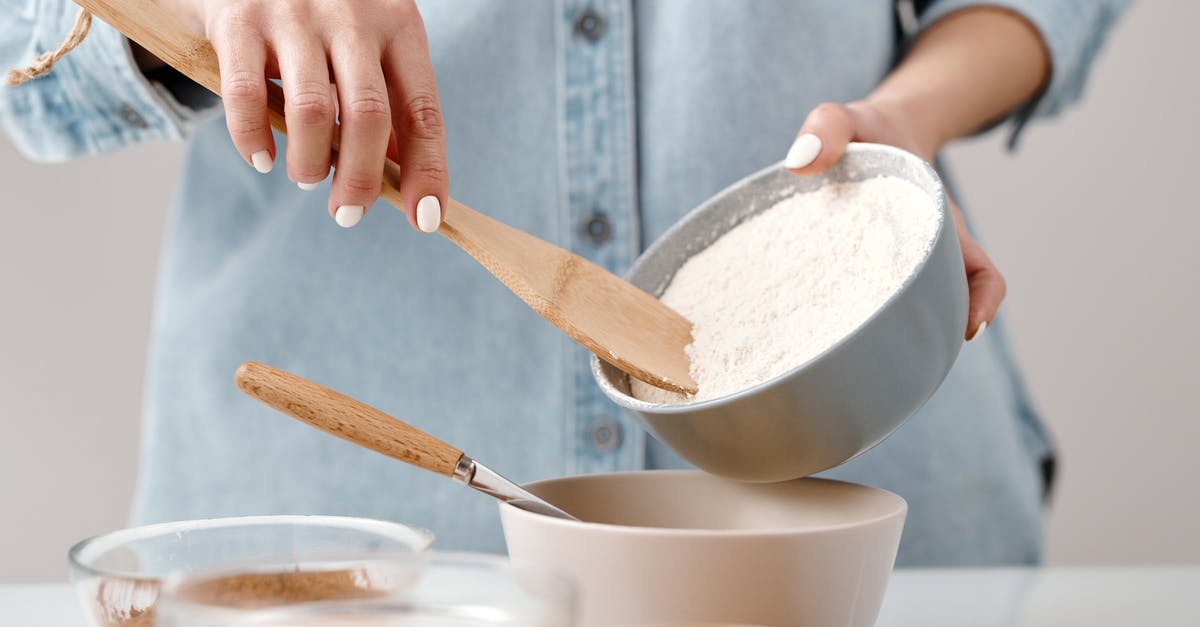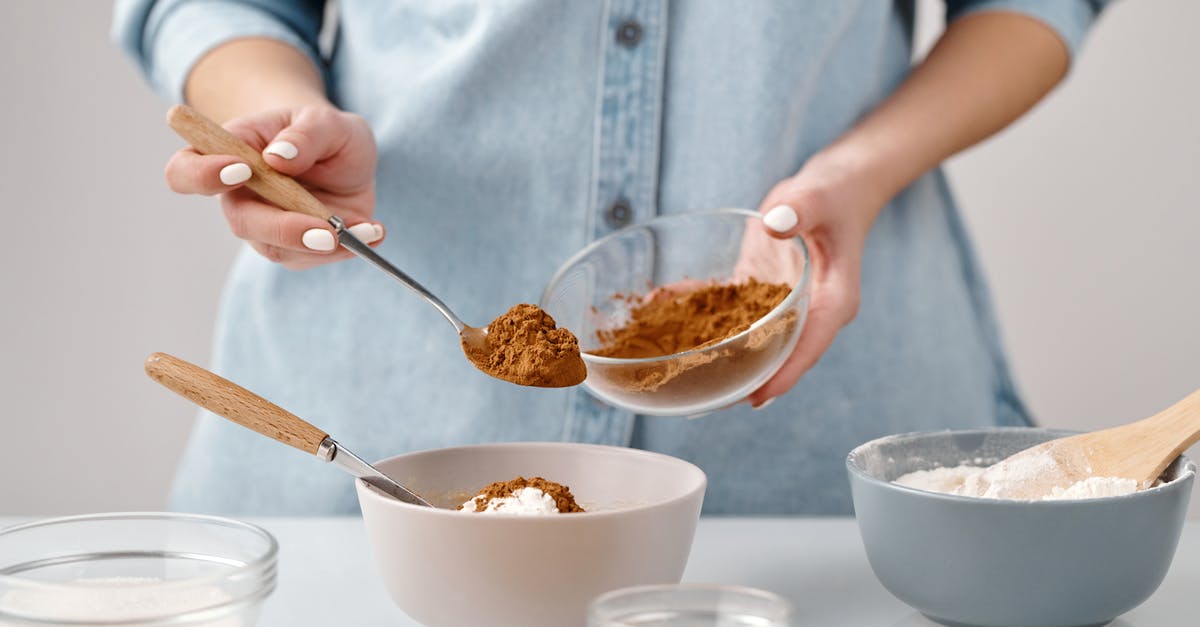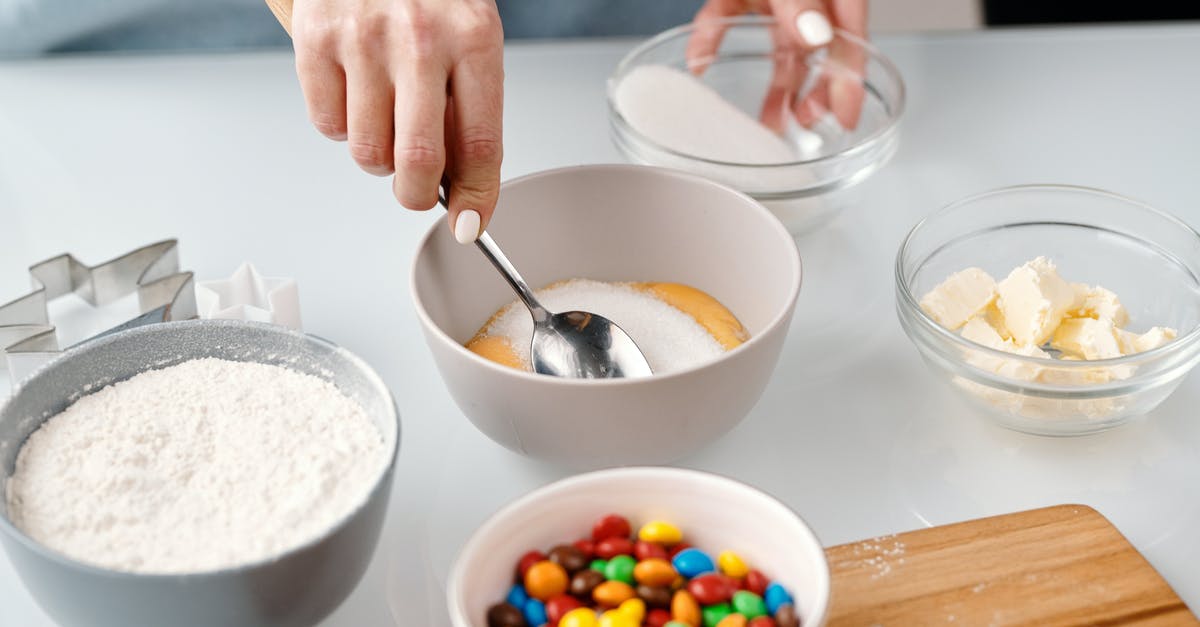How does adding baking soda to soaking beans/lentils reduce the gas they make you have?

I've heard a few times that adding a pinch of baking soda to the water you use to soak beans/lentils in, reduces the gas it makes you have. I've not do any measured experiments myself, but I have anecdotal evidence it does help. But what's the science behind it?
Best Answer
Summary: Baking soda is mostly used to soften the beans faster and decrease cooking time by increasing pH. In some scenarios, it has been shown to aid in breaking down gas-causing sugars as well. Higher concentrations of baking soda and/or pressure cooking may be needed to make this latter effect significant. In most cases, an increased soaking time will have a much greater impact on gas-causing sugars, so baking soda should perhaps be reserved for situations where preparation time is limited.
Baking soda isn't primarily added to reduce gas. As pointed out in previous responses, it can use its sodium ions to replace the magnesium in the cell walls of plants, resulting in faster softening. However, this can also be done with the addition of regular table salt.
The reason baking soda in particular is often added to bean recipes (either during soaking or during cooking itself) is that it makes the beans slightly alkaline, which increases the softening effect. As Harold McGee says in Food and Cooking, "Acidic cooking liquids slow the dissolving of cell-wall hemicelluloses and therefore the softening process, while alkaline cooking water has the reverse effect." He further recommends:
Baking soda at 0.5% (1 teaspoon/qt) can reduce the cooking time by nearly 75%; it contains sodium and in addition is alkaline, which facilitates the dissolving of the cell-wall hemicelluloses.... The alkalinity of baking soda can give an unpleasantly slippery mouth feel and soapy taste.
The softening of the cell walls will allow faster breakdown in some of the sugars with cause gas. Scientific research showed this effect of alkaline substances like baking soda on beans and legumes many decades ago, dating back at least to the early 1970s. Unfortunately, most of this research is only available in obscure food journals, but this free article gives a sense of common findings (here regarding Seker beans). As for the mechanism, they offer:
Ku et al. (1976) noted that soaking in the 0.5% sodium bicarbonate solution might increase softening of the testa [seed coat] and cotyledons [interior of bean] that could increase the sugars extraction.
Ultimately, the combination of an 18-hour soak in the baking soda solution followed by cooking in a pressure cooker achieved the highest reductions in gas-causing sugars (up to 70%). (Pressure cooking also destroys these sugars more effectively than conventional cooking. Also, note that, unlike McGee's advice, they rinsed the beans after soaking and used fresh water for cooking.)
While baking soda speeds cooking and can reduce flatulence, it also has negative impacts on nutrition. Ku et al. (cited above) noted protein destruction when cooking tripled when baking soda was added. But the more significant concern is B vitamins. Again from the Seker bean article:
[A]lkali condition may cause further destruction in the Vitamin B contents, especially thiamin and riboflavin (Swaminathan, 1974). Therefore tap water might be a good alternative to protect vitamins and have a moderate decrease for the flatulence factors.
And actually, it's important to note that pressure cooking had a very significant impact on how effective the baking soda solution was. Assuming an 18-hour soak, the following reductions in gas-causing sugars were seen on average:
- Plain water soak, pressure cooking: 51% reduction
- Baking soda soak, pressure cooking: 69% reduction
- Plain water soak, normal boiling: 48% reduction
- Baking soda soak, normal boiling: 51% reduction
Baking soda thus barely had a significant effect in this study without pressure cooking. Other studies have also seen the effect of baking soda affected by cooking method, but elements such as soaking time may play a role as well. This study, for example, measured statistically significant decreases in gas-causing sugars due to baking soda in five other bean types under almost all types of preparation conditions (6-hour soak vs. 12-hour soak, soaking alone vs. boiling vs. pressure cooking, sprouting for 1-4 days, etc.). However, in almost all preparations the sugar contents were only decreased by a few percent with baking soda. (Even pressure cooking did not change this in most cases.) Only one sugar, raffinose, was reduced by more, in some types of beans achieving an additional 5-14% reduction with baking soda.
However, the important finding to take away from these studies is the relative importance of the various parameters. In order of effect, they are:
- Length of soaking (or germination, for even greater effect)
- Pressure cooking, instead of simmering
- Adding baking soda
For almost all scenarios, it appears that soaking for an extra few hours, doing a 24-hour germination before cooking, or choosing to pressure cook beans will have far greater impacts than adding baking soda. Moreover, extended soaking or germination tend to actually release more nutrients from the beans as various enzymes break down indigestible substances, rather than destroying some of the nutrients as baking soda can. Other studies have suggested that long cooking will also break down gas-causing compounds more quickly than soaking could do. Thus, in some circumstances, an extended low simmer with no prior soaking might achieve a greater reduction than a brief soaking period with baking soda. (The baking soda might even be counterproductive in this case, since it would soften the beans faster and not allow a longer cooking period.)
In any case, most of these studies have assumed a rather significant amount of baking soda during soaking (generally around McGee's recommendation of 1 tsp/qt), since the pH must be increased significantly for the baking soda to have effects. Adding only a "pinch" may have only a negligible impact, particularly if the beans are only boiled and not pressure cooked.
Moral of the story (again): While baking soda does something in reducing gas, the effect is generally quite small. Use it primarily to speed up cooking or soften beans instead.
Pictures about "How does adding baking soda to soaking beans/lentils reduce the gas they make you have?"



Quick Answer about "How does adding baking soda to soaking beans/lentils reduce the gas they make you have?"
Method 1: Baking soda The baking soda helps break down some of the beans' natural gas-making sugars. I tested this while fixing one of my favorite slow cooker recipes: red beans and sausage. To degas with baking soda, add a teaspoon of baking soda to 4 quarts of water.What does soaking beans in baking soda do?
When we add baking soda to a pot of cooking beans, it results in tender beans in less time. On the flip side, adding acid causes the cell structure of legumes to remain firm. If there is too much acid in the pot, the beans may never soften enough to be ready to eat.Does baking soda reduce flatulence?
Combine Lemon & Baking Soda "This mix is great for bloating and flatulence and starts working immediately." Baking soda acts as an antacid, so it can help relieve gas. However, you want to be careful not to consume too much, as baking soda contains a large amount of sodium, which can be bad for your body in excess.What does baking soda do to lentils?
Legumes will cook faster in slightly alkaline water and there are many recipes suggesting adding sodium bicarbonate (baking soda) to the cooking water. This method will soften the legumes but will leach important nutrition into the water.Can you soak lentils in baking soda?
Research dating back more than 25 years (\u201cEffect of Processing on Flatus-Producing Factors in Legumes\u201c) found that adding baking soda to the soak water of dried beans before cooking (about 1/16 teaspoon per quart) significantly decreases the content of the raffinose family of sugars.Gasless Beans “Cooking Beans and eliminating gas”
More answers regarding how does adding baking soda to soaking beans/lentils reduce the gas they make you have?
Answer 2
The actual action of soaking is what does most of the work.
Most legumes have complex oligosaccharides, a type of complex sugar. Digestion of this complex sugar is what causes flatulence. By soaking your beans will help remove some of this excess sugar. Be sure you discard the soaking water.
Though it is often said that adding baking soda helps I've yet to see any verifiable evidence that it would help. Also, don't forget that baking soda isn't tasteless, it could easily add a salty or soapy flavor to your once pristine beans.
Answer 3
In addition to what rheone said, I have noticed that using baking soda kind of softens food. A characteristica example of this is
Use baking soda in green vegetables to keep them green after cooking is done
which isn't the best solution because just a minute is enough to miss it and eat a soup instead of green vegetables.
I have also noticed that if you use soda in your beans overnight, then you are easily able to peel them! The reason for this is that soda really softens them, beacause it interacts with peel in a way that it makes peel's pores bigger which makes easily for the oligosaccharides to move out, due to difference in concentration.
Baucause saccharides in general are long molecules we have to help them get out, so a good solution is to make room for them!
Answer 4
WHY ADDING SODIUM BICARBONATE SOFTENS BEANS AND LENTILS:
The reason is that as beans age, there is dehydration (My Brazilian mom used to tell that the difference between an old crop bean (cheaper) and a new crop, is the as you fingernail pinch them, the older one is smaller than the new crop one's). Soaking with Sodium Bicarbonate in the cold water takes the Sodium Bicarbonate in intimate contact with the beans starches ,gelatinizing them, reducing the cooking time and making it a creamear beans. But, if you use recent crop beans and you keep the same cooking time with Sodium Bicarbonate, it will turn into a soup. HOW MUCH ENERGY COULD WE SAVE, REDUCING THE COOKING TIME!!!! My rich girl friend (buys only high priced beans, tells me she cooks it under 15 min. in a high pressure cooker... I have found that if a cake recipe calls for Sodium Bicarbonate and Baking Powder, I get a better cake if I add the Sodium Bicarbonate+ liquids, whip blend it and them add the Baking Powder.
Sources: Stack Exchange - This article follows the attribution requirements of Stack Exchange and is licensed under CC BY-SA 3.0.
Images: Nicole Michalou, Nicole Michalou, Nicole Michalou, Nicole Michalou
